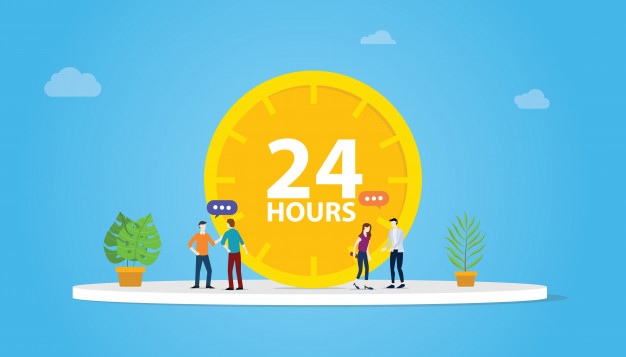How to find an extra hour in your day and achieve more
Wishing to stop time, or for more hours in the day, is a common desire among busy folk. It's the reason entrepreneurs play catch up on weekends or burn the midnight oil, when there are fewer distractions or demands on their time.
While that's fine once in a while, studies show – time and again – that regularly working longer hours and skipping breaks is neither good for our health, nor our cognitive function.
One study of British civil servants, which looked at the association between long working hours and cognitive function in middle age, found those who worked 55 hours per week scored lower on cognitive tests on memory, reasoning and vocabulary compared to those who worked up to a maximum of 40 hours a week.
|
The ability to control time being out of the reach of most mortals, we must instead adjust our attitude towards it. Because, if we begin to look critically at the way we approach the working day, we are likely to find ways to improve our productivity.
In this article, we'll cover four methods that can help us to form better work habits. Try these methods, and you'll be able to find at least an extra hour in your working day. How you spend that hour – work or play – is up to you!
- Calendar optimization
- Goal setting with your colleagues
- Communication hours
- Give up attempting to 'multitask'
But first, let’s talk about the need for structure and planning, as this is something many either overlook or reject.
Failure by freedom
"True freedom is impossible without a mind made free by discipline."
Mortimer J. Adler
Plenty of entrepreneurs leave the employee life behind to pursue a path of greater freedom and autonomy. But there is a reason that millions of smart and talented people all over the world choose to work for organizations, rather than for themselves – and it's not just the relative safety of a monthly pay packet. Structure, direction, and good management keep people on-track, motivated, productive and happy.
Total freedom is a poisoned chalice. To be productive and engaged, people need to know what they're doing, and why they're doing it. And the same goes for entrepreneurs. Think back to when you last worked for someone else. Most likely, these statements were true:
- You had a clear sense of what was required from you
- Goals, expectations or targets were communicated to you
- You were steered (and praised) by a manager
- You had some sort of routine in the form of set working hours and breaks
That support framework that many of us grow used to falls away when you are calling the shots, and it can take its toll on efficiency.
Even with the recent trend towards more flexible and agile working practices for employees, the most high-functioning businesses always have structure underpinning everything. Retail giant Zappos, which once championed the decentralized 'holacracy' system with no job titles, managers or hierarchy, has since decided to bring back managers. That says it all: how people work best is with a level of accountability.
Academic research found that empowering workers can cause uncertainty and resentment, while freedom to make their own decisions and work without monitoring can be detrimental to productivity.
(Source: The UK's University of Exeter)
Finding the time
"Time is what we want most, but what we use worst."
William Penn
Time is a precious commodity, but humans simply aren't wired to view the hours we have left on earth with any real sense of urgency.
Perhaps one of the most striking visualizations we've seen – which can help us to view time as finite – comes from the brilliant blog WaitButWhy. It divides the average human life up into weeks (which look alarmingly paltry) and then asks us to evaluate how we use those weeks.
While thinking about how long we have left is a bit grim, realising how limited our time is will incentivize us to use it wisely.
Before we claw back those hours, we need to know where we are losing the most time. News apps? Admin? Facebook? We've put together this little quiz to help you highlight where your working time is going askew.
What is the first thing you do when you start work?
- Go through all my emails, make coffee, chat to colleagues, read the news, write a to-do list
- Browse through emails, deal with anything urgent, then get started on my to-do list
- Check in with my teams and see how everyone’s evening was
- Read some articles, check the news headlines, have a quick scroll through LinkedIn and Instagram, make a cappuccino and build up to starting the day
How do you go about your daily work routine?
- I work on what is right in front of me and deal with tasks as they come in
- I use a to-do list and work on what seems most appropriate
- I do my own tasks while having an open door policy in case my team needs me
- I try to stick to a to-do list but things will always pop-up throughout the day and I’ll have to deal with those instead
How often do you check your smartphone?
- No rules: whenever I feel like it, I have a quick look and then carry on with work
- After a burst of concentrated work, I like to scroll for a bit to take a break
- Whenever I see or hear a notification
- I often find myself reaching for my phone habitually, especially when I have a task to do that’s frustrating or difficult
How many meetings do you do per day?
- Lots, but I tend to get on with other jobs while I’m listening to the meeting
- Not daily: I always question the need for meetings and insist on keeping them short
- A few per day: I like to keep on top of what is going on and I want to find out how individuals are coping
- It varies a lot from day to day, I don’t really track this
Mostly 1s: Multitasking madness
You're hopping between different tasks and letting every new thing become important. You need more structure to optimize every hour. The truth is that attempting to multitask loses us time, rather than gaining us extra minutes (more on that later). Set aside time to work on one chosen task at a time, and you'll achieve so much more.
Mostly 2s: On the right track
You've got structure, you understand your own limits and your strengths. Remember that productivity is a skill that takes a lot of work to perfect. Keep at it!
Mostly 3s: The people person
You mean well, but you're letting people create unnecessary demands on your time which pull you away from important tasks only you can do. Try allocating a specific time slot in the day for interruptions, with a 'do not disturb unless urgent' rule for the rest of the day.
Mostly 4s: Distractophile
You can never get into 'the zone' if you keep dragging yourself out of it. Distractions will always crop up during the day, but that doesn't mean you should invite them in so willingly. Your time and focus is being wasted by having to constantly reset. Try putting your smartphone in another room on silent, remove all notifications from your desktop, and work on one task at a time in bursts of 25 minutes.
|
Now you know where time is being wasted, you can take some decisive steps towards getting the most out of your day.
Four ways to become a Time Lord
"It's how we spend our time here and now, that really matters. If you are fed up with the way you have come to interact with time, change it."
Marcia Wieder
We’ve had the insights, time for action. What are the best ways you can start clawing back hours and optimize your day? Here we go...
1. Calendar optimization
The humble calendar app has potential beyond alerting you to upcoming meetings. It can also be used as a to-do list, with reminders to add an element of pressure that'll help you get things done.
One of the big problems with working from a simple list is that we tend to overestimate what we can achieve in one day. But, by combining our to-do list and our calendars, we get a much clearer idea of what can be achieved in a day.
Seeing our entire day at a glance forces us to be realistic and ruthless about what makes it in and what has to go. The limits and the finality of your time is right there in front of you, all sectioned out. It forces you to protect your time from being used for non-essential tasks.
You'll quickly realize that it's only possible to do one or two tasks per day to a high standard, especially because you'll find your concentration peaks and dips throughout the day. That's why it's also crucial to establish the times of day you focus best as soon as you can, so you can plan different tasks accordingly.
2. Goal setting with your colleagues
With no manager to check up on them, entrepreneurs need to find ways to create accountability on a small scale. Setting personal goals and sharing them with a colleague or business coach is one such way to do that.
People have a 65% chance of meeting a goal after committing to another person. Their chances of success increase to 95% when they build in ongoing meetings with people who check in on their progress.
(Source: ATSD)
|
Another method is to make your calendar (which you're now using as a to-do list, remember!) public and viewable to all your employees. This will help them plan around you, and you'll remember the expectation is on you when you reach for your phone or start to drift.
3. Communication hour
For those business owners who keep finding themselves interrupted by calls, check-ins and chattiness, it may be time to reconsider that "open door policy".
Instead, book in an open door hour each day, when your colleagues should feel free to disturb you. The rest of the time you'll be focusing on pressing tasks and, without constant distractions, that'll be vastly easier.
Making your schedule public and including your open door hours in your email signature is a great way of managing expectations. But also, explain to people why you're doing it. With everyone striving to be more efficient, they'll get it.
In a similar vein, let's talk about emails. How often are you distracted from tasks by your inbox? You might think those messages are urgent, but will you really lose that client if you don’t get back to them immediately? Will everything collapse if someone has to wait two hours to hear from you? In 99% of cases, people can wait. And, if they can't, don't worry because they'll be calling you, not emailing.
So, just as you have created an open door hour, why not turn off email desktop notifications, and schedule half an hour at the end of the day to go through your inbox?
On average, employees spend about 28% of their work week reading or responding to emails.
4. Give up attempting to multitask
While we all like to believe we are maestros who can juggle multiple tasks at once, the truth is we're simply creating new ways to waste minutes, as we switch back and forth between different jobs and try to regain focus
Studies show...
Research into media multitasking in young people found that it led to increased distractibility and poor performance from certain parts of the brain (Source: NeuroImage)
|
One study found that, in all age groups, heavy media multitaskers exhibited lower working memory performance (Source: National Library of Medicine)
|
Time lost when switching back and forth between tasks increases with the complexity and the unfamiliarity of the tasks (Source: The Journal of Experimental Psychology)
|
It's time to reject the myth that we can do more than one thing successfully and to a high standard at once, and start planning our day around a 'one task at a time' rule.
When you're working on that one specified task, remove all ambient distractions, and potential for distraction. That might mean leaving your phone in another room on silent, and shutting down all browser windows except for those required to get the job done.







